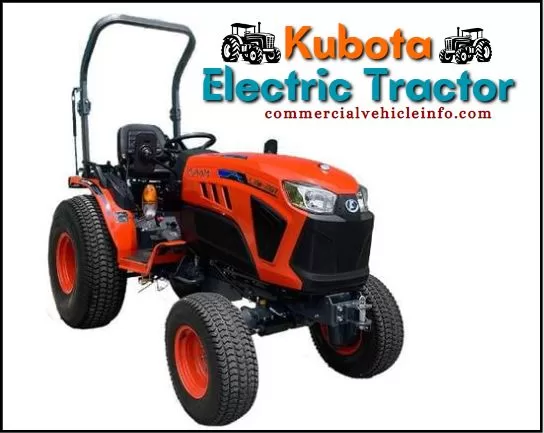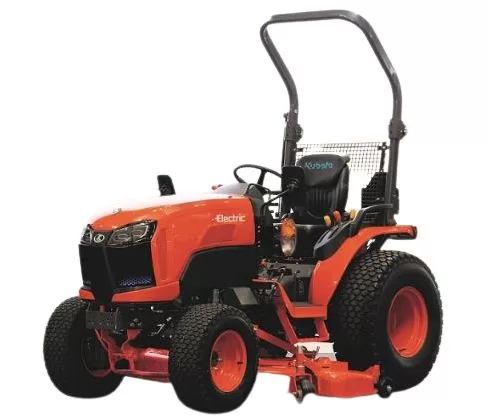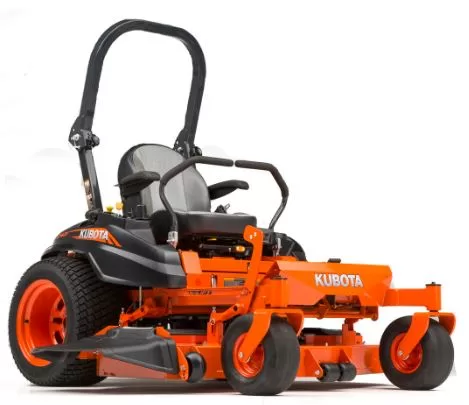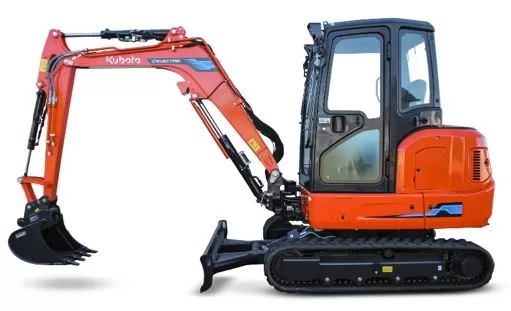Kubota Electric Tractor: In today’s world, technology and agriculture are increasingly coming together to create new and innovative ways to farm. One such example is the Kubota Electric Tractor, a revolutionary machine that uses electricity to power its operations.
This makes it a more sustainable and efficient option than traditional tractors, which run on fossil fuels.
In this article, we will take a closer look at the Kubota Electric Tractor, exploring its features, benefits, and potential impact on modern farming practices.
We will also discuss the future of electric tractors and how they could help to shape the future of agriculture.
About Kubota Electric Tractor
Kubota Electric Tractor is a fully autonomous and electric tractor that represents the future of farming. It is equipped with advanced technologies such as artificial intelligence and electrification technology.
Kubota unveiled its “X tractor – cross tractor” to commemorate the 130th anniversary of its founding. The tractor is a completely autonomous tractor that represents the future of farming drawn by Kubota.
Since the launch of AGRIROBO tractors in 2017, Kubota has expanded autonomous agricultural machinery to the AGRIROBO Series.
The Kubota aims to realize the full-scale introduction of smart farming, which is continuously expected by farmers.
Why Choose a Kubota Electric Tractor?
Kubota Electric Tractors offer a range of benefits over traditional tractors, making them an ideal choice for modern farming. Here are some reasons why you should choose a Kubota Electric Tractor:
- Sustainability: Kubota Electric Tractors produce zero emissions, making them an environmentally friendly option for farmers.
- Advanced Technologies: Kubota Electric Tractors are equipped with advanced technologies such as artificial intelligence and electrification technology, making them cutting-edge solutions for modern farming.
- Increased Efficiency: The autonomous capabilities of Kubota Electric Tractors reduce the need for manual labor, increasing efficiency and addressing the challenges of labor shortage and the aging of farmers.
- Reduced Maintenance Costs: Kubota Electric Tractors have lower maintenance and repair costs compared to traditional tractors, making them a cost-effective option over time.
- Precision Farming: Kubota Electric Tractors enable precision farming techniques, allowing farmers to optimize their operations and maximize yields.
- Future-Ready: Kubota is continuously developing technologies for smart farming and aims to lead the way in the future of the farming industry.
- Quiet Operation: Kubota Electric Tractors produce less noise pollution compared to traditional tractors, making them a more pleasant option for farmers and nearby residents.
Overall, Kubota Electric Tractors offer a range of benefits that make them an ideal choice for modern farming.
They are sustainable, efficient, cost-effective, and future-ready, making them a smart investment for farmers looking to optimize their operations.
Kubota Electric Tractor Price
- Kubota BX Series Electric Tractor Price: Starting price $11,827.00
- Kubota LX Compact Tractors: Starting price of $19,137.00
Kubota Electric Tractor Key Features
The Kubota Electric Tractor encompasses an array of cutting-edge attributes that position it as a forward-looking solution for contemporary farming practices. Here are some key features of the Kubota Electric Tractor:
- Full Autonomy: Engineered for autonomous operation, the Kubota Electric Tractor significantly reduces the necessity for manual intervention, thereby amplifying operational efficiency.
- Electric Propulsion: With its all-electric nature, this tractor emits zero pollutants, making it an environmentally conscious choice that aligns with sustainable farming practices.
- Integration of Advanced Technologies: Seamlessly incorporating artificial intelligence (AI) and electrification, the Kubota Electric Tractor stays at the forefront of intelligent agriculture.
- Versatile Performance: Tailored to tackle an array of tasks, the tractor boasts adaptable riding options and the versatility of a four-wheel crawler, ensuring flexibility on the field.
- Enhanced Productivity: The sophisticated attributes of the Kubota Electric Tractor foster heightened productivity on the farm, empowering farmers to accomplish their tasks with greater efficiency.
- Minimal Environmental Impact: By eradicating emissions and mitigating noise pollution, this electric tractor plays a role in reducing the ecological footprint of farming operations.
- Precision Farming: The Kubota Electric Tractor facilitates precision farming methodologies, empowering farmers to optimize their practices and maximize yields through meticulous planning.
- Future-Proof Design: Kubota maintains an unwavering commitment to the advancement of smart farming technologies, positioning itself as a frontrunner in shaping the future landscape of the agricultural industry.
In amalgamating advanced technologies, sustainability, and operational efficiency, the Kubota Electric Tractor emerges as a potent and environmentally friendly solution, poised to redefine modern agriculture.
Kubota Electric Tractor Key Specs
- Engine Gross Power: 24.8 – 39.8 HP
- PTO Power: 19.5 – 32.6 HP
- Weight: 3,300 pounds
- Dimensions: 124.4 x 60.6 x 72.8 inches
- Lift Capacity: 1325 lbs
- Hydraulics: 2 double-acting remotes
- Battery: Large-capacity battery that provides up to four hours of continuous operation
- Performance: Top speed of 20 mph
- Comfort and Safety: Spacious cab with a comfortable seat, roll bar, and seat belts
- Applications: Green space management, farming, construction
- Other features: Independent PTO, HST transmission, multiple hydraulic outlets.
Kubota Electric Tractor Specifications
Electric Compact Tractor Specs
| Feature | Specification |
| Model | BX1870E |
| Engine | Electric motor |
| Horsepower | 26 hp |
| Battery | 36 kWh |
| Continuous run time | 4 hours |
| Top speed | 20 mph |
| Weight | 3,300 lb |
| Dimensions |
124.4″ x 60.6″ x 72.8″
|
| PTO | 540 rpm |
| Hydraulics |
2 double-acting remotes
|
| Other | Independent PTO, HST transmission, multiple hydraulic outlets |
Kubota Electric Mower Specs
| Feature | Specification |
| Cutting width | 60 inches |
| Cutting height | 1.5 to 4 inches |
| Deck type | Zero-turn |
| Engine | Electric motor |
| Battery | 48-volt battery |
| Run time | Up to 4 hours |
| Top speed | 12 mph |
| Weight | 1,200 pounds |
| Dimensions |
62 x 48 x 52 inches
|
| Other |
Zero-turn steering, electric start, cruise control, LED headlights
|
Kubota Electric Excavator Specs
| Feature | Specification |
| Model | KX030-4E |
| Engine | Electric motor |
| Power | 26.5 kW |
| Operating weight | 6,426 lbs |
| Bucket capacity | 0.75 cu. yds. |
| Digging depth | 9 ft. 7 in. |
| Dumping height | 10 ft. 4 in. |
| Reach | 11 ft. 2 in. |
| Travel speed | 3.4 mph |
| Battery | 66 kWh |
| Run time | Up to 4 hours |
| Charging time | 4 hours |
| Features |
Zero-tail swing, cab with climate control, LED lights
|
Benefits of Kubota Electric Tractors
Kubota Electric Tractors offer a range of benefits over traditional tractors, making them an ideal choice for modern farming. Here are some of the key benefits of Kubota Electric Tractors:
- Sustainability: Kubota Electric Tractors produce zero emissions, making them an environmentally friendly option for farmers.
- Advanced Technologies: Kubota Electric Tractors are equipped with advanced technologies such as artificial intelligence and electrification technology, making them cutting-edge solutions for modern farming.
- Increased Efficiency: The autonomous capabilities of Kubota Electric Tractors reduce the need for manual labor, increasing efficiency and addressing the challenges of labor shortage and the aging of farmers.
- Reduced Maintenance Costs: Kubota Electric Tractors have lower maintenance and repair costs compared to traditional tractors, making them a cost-effective option over time.
- Precision Farming: Kubota Electric Tractors enable precision farming techniques, allowing farmers to optimize their operations and maximize yields.
- Future-Ready: Kubota is continuously developing technologies for smart farming and aims to lead the way in the future of the farming industry.
- Quiet Operation: Kubota Electric Tractors produce less noise pollution compared to traditional tractors, making them a more pleasant option for farmers and nearby residents.
- Cost Savings: Kubota Electric Tractors offer cost savings over time, with lower maintenance and repair costs and reduced fuel costs.
Future of Kubota Electric Tractor
- Kubota unveiled a concept tractor that is 100% electric and fully autonomous, showcasing their vision for the future of agriculture.
- Electric tractors, like Kubota Electric Tractors, offer advantages such as cleaner emissions, lower maintenance costs, and quieter operation.
- Kubota is set to launch electric tractors in 2023, becoming the first Japanese manufacturer to do so.
- The concept tractor from Kubota is equipped with advanced technologies like artificial intelligence and electrification, paving the way for the future of farming.
- Kubota has been developing autonomous agricultural machinery, such as the AGRIROBO Series, and continues to focus on labor-saving and precision farming technologies.
Overall, Kubota is committed to developing innovative technologies for smart farming and addressing the challenges faced by the agriculture industry, including labor shortage and the aging of farmers.
The introduction of electric tractors represents a significant step towards a more sustainable and efficient future in farming.
Kubota Electric Tractor Reviews
The Kubota LXe-261 marks Kubota Corporation’s pioneering entry into the realm of all-electric compact tractors. Equipped with a robust 19.1 kW (26 horsepower) electric motor and a high-capacity lithium-ion battery, it can deliver up to four hours of uninterrupted performance on a solitary charge.
With a maximum speed of 15 mph and an impressive towing capability of 3,300 pounds, the LXe-261 is a game-changer in the world of electric tractors.
Full review YouTube video check here.
Kubota Electric Tractor Problems and Solutions
The Kubota Electric Tractor, while a remarkable innovation in modern farming, may encounter certain challenges. Here, we address these issues and present potential solutions:
Limited Range and Battery Life:
- Problem: Electric tractors often face limitations in terms of operating range and battery life, which can impact productivity during longer work sessions.
- Solution: Implementing advanced battery technologies and energy management systems can extend the tractor’s range and optimize battery life. Additionally, incorporating rapid charging solutions could minimize downtime.
Initial Cost and Affordability:
- Problem: Electric tractors can have higher upfront costs compared to conventional models, potentially posing financial constraints for some farmers.
- Solution: Offering incentives or subsidies for adopting electric tractors, along with providing flexible financing options, can help mitigate the initial cost burden and encourage wider adoption.
Charging Infrastructure:
- Problem: Establishing a widespread and efficient charging infrastructure for electric tractors may be a logistical challenge in some regions.
- Solution: Collaborating with governments and private stakeholders to develop charging networks specifically tailored to agricultural areas can alleviate this challenge. Additionally, integrating on-farm charging solutions using renewable energy sources can provide autonomy.
Maintenance and Technical Expertise:
- Problem: Electric tractors may require specialized technical knowledge for maintenance and repairs, which might not be readily available in all regions.
- Solution: Providing comprehensive training programs for farmers and mechanics on electric tractor maintenance can build the necessary expertise. Developing a network of certified service centers can ensure timely assistance.
Power and Performance Equivalence:
- Problem: Farmers may be concerned about the power and performance of electric tractors compared to conventional diesel counterparts.
- Solution: Continuously improving motor and battery technologies can enhance the power output and overall performance of electric tractors, addressing any performance-related concerns.
Data Security and Connectivity:
- Problem: Electric tractors, equipped with advanced technologies, require robust data security and reliable connectivity, which can be susceptible to cyber threats.
- Solution: Implementing stringent cybersecurity measures and encryption protocols, along with regular software updates, can safeguard tractor data and ensure secure connectivity.
What is the difference between a Kubota Electric Tractor and a Traditional Tractor?
Kubota Electric Tractors is a new and innovative solution for modern farming, offering several advantages over traditional tractors.
Here are some key differences between Kubota Electric Tractors and traditional tractors:
=> Kubota Electric Tractors:
- Fully electric and produce zero emissions.
- Equipped with advanced technologies such as artificial intelligence and electrification technology.
- Autonomous capabilities, reduce the need for manual labor.
- Lower maintenance costs compared to traditional tractors.
- Quieter operation, reducing noise pollution.
- Future-ready, embracing the future of farming with advanced technologies.
=> Traditional Tractors:
- Run on diesel or gasoline engines, producing emissions.
- Require manual operation.
- Higher maintenance costs compared to electric tractors.
- The louder operation generates noise pollution.
Overall, Kubota Electric Tractors offer several advantages over traditional tractors, including sustainability, increased efficiency, reduced maintenance costs, and quieter operation.
They represent the future of farming with their advanced technologies and autonomous capabilities
Conclusion
The Kubota Electric Tractor marks a turning point in the annals of agriculture. It blends technology and tradition, offering a glimpse of what the future holds.
As electric tractors sow the seeds of change across the global landscape, the harvest they yield transcends mere crops – it ushers in a new era of sustainable farming, where innovation plows the way for a greener and brighter tomorrow.
For more details visit the commercialvehicleinfo.com.
Kubota Electric Tractor FAQs
Kubota stands out as a premier electric tractor manufacturer due to its innovative integration of cutting-edge technologies, commitment to sustainable farming practices, and a legacy of engineering excellence, all culminating in reliable and high-performance electric tractors.
A Kubota Electric Tractor works by using a rechargeable battery to power an electric motor, which in turn drives the tractor’s wheels.
Charging time varies depending on the model and charger used. However, most models can be fully charged in 8-10 hours.
The battery life of a Kubota Electric Tractor depends on the model and usage. However, most models have a battery life of 4-6 hours.
The Kubota Concept Tractor is a fully autonomous electric tractor that paves the way for the future of farming with advanced technologies.
The Kubota Electric Tractor produces zero emissions, making it an environmentally friendly option for farmers.
Maintenance requirements are minimal, with no need for oil changes or other routine maintenance tasks. However, it is important to follow the manufacturer’s guidelines for charging and maintenance to ensure the longevity of the battery.
Kubota Electric Tractors operate more quietly compared to traditional tractors, reducing noise pollution.
The Kubota Electric Tractor enables precision farming techniques, allowing farmers to optimize their operations and maximize yields.
Kubota Electric Tractors offer a sustainable solution for modern farming, reducing emissions and operating costs while increasing efficiency and productivity.



